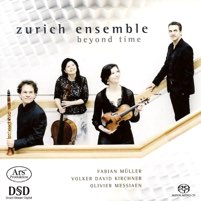Le programme de musique contemporaine proposé par ce SACD à la fois homogène, brillant et exigeant nous ouvre les portes d’univers musicaux passionnants. « Am Anfang » de Fabian Müller, pièce en trois mouvements pour Soprano et Ensemble sur des textes de Tim Krohn, composée entre 2010 et 2015, est une mise en bouche des plus efficaces. Vient ensuite « Exil » signé Volker David Kirchner. Œuvre en cinq parties datant de 1995 et le célèbre « Quatuor pour la fin du temps » qu’Olivier Messiaen composa durant la seconde guerre mondiale, en 1940, alors qu’il était prisonnier. Le langage musical de cette œuvre immense, qui se décline en huit mouvements, est selon le compositeur « essentiellement immatériel, spirituel, catholique. Des modes, réalisant mélodiquement et harmoniquement une sorte d’ubiquité tonale, y rapprochent l’auditeur de l’éternité dans l’espace ou infini. Des rythmes spéciaux, hors de toute mesure, y contribuent puissamment à éloigner le temporel » Prenant son inspiration dans « L’Apocalypse de Saint Jean », la partition de Messiaen est « probablement la plus abordable pour s’initier à quelques unes des caractéristiques du langage du compositeur français, nous dit Alain Poirier. Parmi celles mises en œuvre, citons les procédés rythmiques de valeur ajoutée, d’augmentation et de diminution, de pédales rythmiques et de rythmes « non rétrogradables », à côté de l’utilisation des modes à « transposition limité ». Le Zurich Ensemble, avec Fabio Di Casola à la clarinette, Kamila Schatz au violon, Pi-Chin Chien au violoncelle et Benjamin Engeli au piano, subjugue véritablement par un jeu époustouflant de maîtrise. La précision du détail atteint ici des sommets. Si la perfection en musique existait, c’est vers ce jeu inouï que se porteraient nos regards. Tout est confondant de beauté, d’émotion et de passion. La rigueur implacable offre ses plus beaux atours et nous laisse pantois devant un tel « miracle musical ». Vous l’aurez compris, ce SACD est une découverte majeure, à la fois dans sa démarche éditoriale et dans son contenu. Bref, un SACD de référence.
Jean-Jacques Millo The program of contemporary music proposed on this SACD is homogenous, brilliant and demanding, and opens doors to passionate musical universes. “Am Afang” by Fabian Müller, a work in three movements for soprano and ensemble on texts by Tim Krohn, composed between 2010 and 2015, is an effective appetizer. Next come “Exil” signed Volker David Kirchner, a work in five parts dating from 1995, and the famous “Quartet for the End of Time” that Olivier Messiaen composed during the Second World War, in 1940, when he was a prisoner. The musical language of this immense work, which is made up of eight movements, is, according to the composer, “essentially immaterial, spiritual, catholic. Keys, in terms of melody and harmony, that bring the listener closer to eternity in space, or the infinite. Special rhythms, out of time, contribute powerfully to distancing the here and now.” Taking his inspiration from “The Apocalypse of Saint Jean,” the score by Messiaen is “probably the most understandable in order to initiate oneself to some of the characteristics of the language of the French composer,” tells us Alain Poirier. Among those to be heard are rhythmic procedures of added value, of augmentation and of diminution, of rhythmic pedals and “non-retrogradable” rhythms, along with the use of methods of “limited transposition.” The Zurich Ensemble, with Fabio De Casola on clarinet, Kamila Schwat on violin, Pi-Chin Chien on cello, and Benjamin Engeli on piano, truly subjugate us by playing that is astounding in its mastery. Precision to detail here attains summits. If perfection in music existed, all one need do is look towards the amazing playing here. All is disconcertingly beautiful, emotional, passionate. Implacable rigor is at its finest and leaves us speechless before such a “musical miracle.” You understood right, this SACD is a major discovery, both for its release and its content. In brief, here is a landmark SACD. Translation Lawrence Schulman |  |